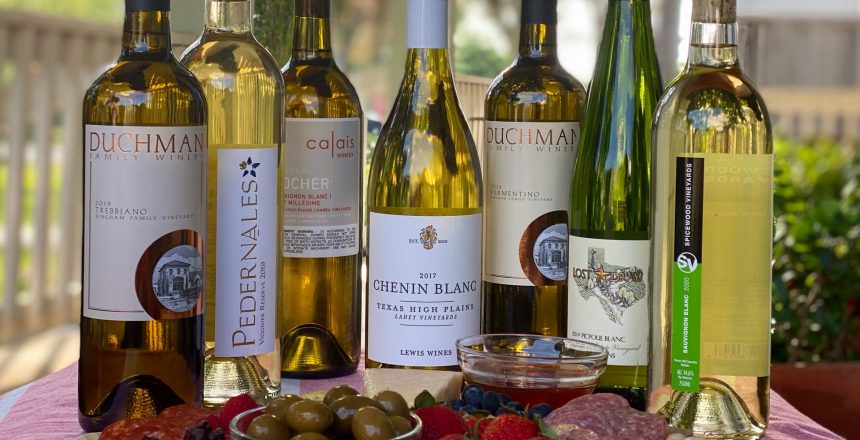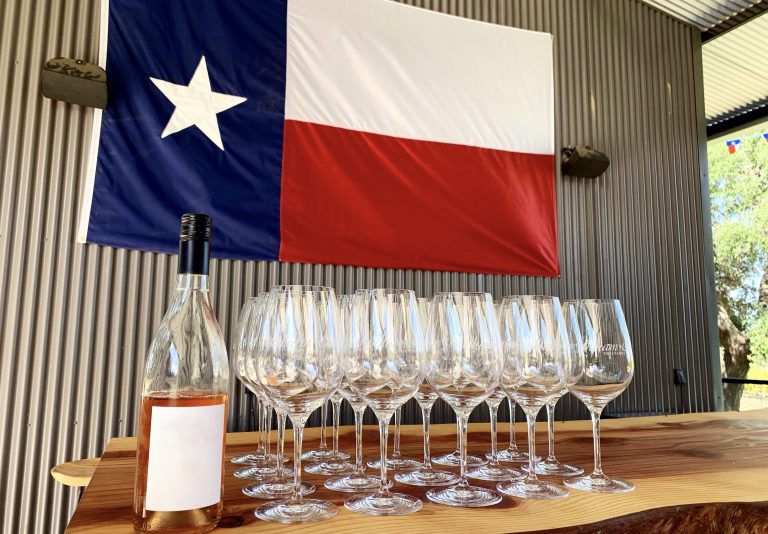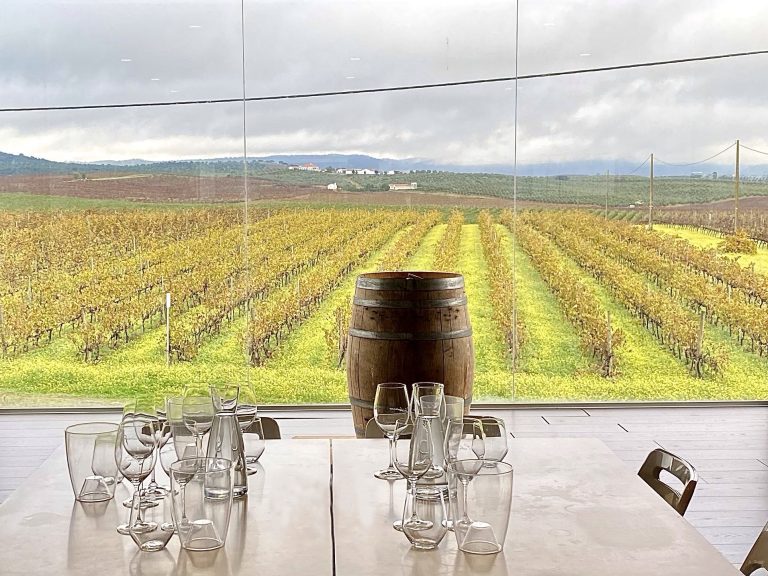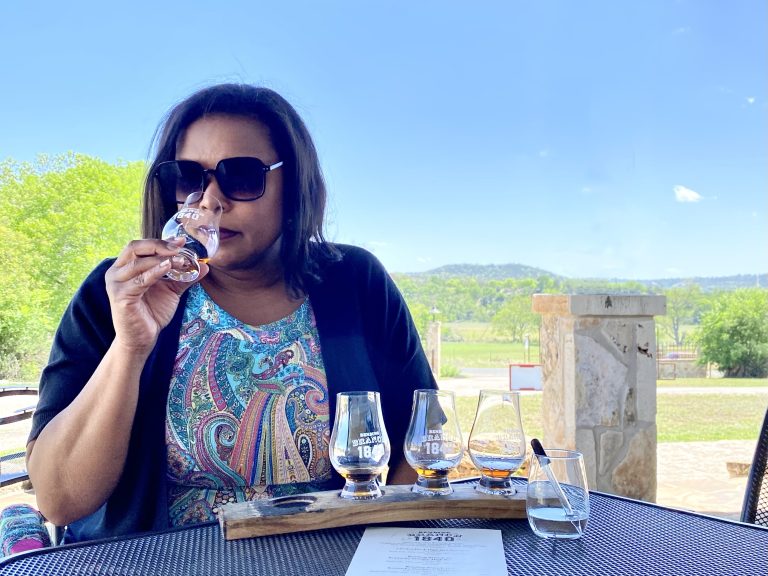“The beautiful thing about Texas is not what specific variety we can make, but the diversity of the varieties that we can make.”
Kerrville Hills Winery Owner John Rivenburgh
Early in my wine drinking life, I was all about the red wine. At times I would practically shun white wine. Of course these days, I drink as much white and sparkling wine as I do red, if not more. I think the change came when I actually started having wine with my meals rather than just casually drinking a glass. I’ll just put it out there – white wines pair much better with meals that red wines do. I said what I said! Maybe I’ve become cranky with old(ish) age, but I’ve become quite the impatient, borderline judgmental person when people insist that they don’t like white wines. Yes, judgment is bad and I’m supposed to be here to help, but sometimes people’s close mindedness just annoys the hell out of me. If you’ve had all the white wines and don’t like any of them, fair enough. But until then, don’t come at me with that!
All of this got me to thinking about the red wine dominated Texas wine industry. Over 2/3 of the state’s production is devoted to red wine production, which leaves about a third devoted to white wines. Now don’t get me wrong, I’m crazy about the Tempranillo, Mourvèdre, Sangiovese, Tannat, and so many other reds made in the state, but you are definitely missing out if you’re overlooking Texas white wine.
The most planted Texas white wine variety is Blanc du Bois, and surprisingly I haven’t had much of it. But I have had experience with varietals such as Viognier, Riesling, Roussanne, Sauvignon Blanc, Albariño, Picpoul Blanc, Chenin Blanc, and Vermemtino to name a few and they are absolutely worth seeking out.
Given its reputation as a warm place, many aren’t aware, or don’t think that they can find quality Texas white wine. But there is more to the Texas climate and terroir than folks realize. The sheer diversity of the grapes grown in the state is attributed to the numerous microclimates throughout the state. “The beautiful thing about Texas is not what specific variety we can make, but the diversity of the varieties that we can make” says consultant, winemaker, grape grower, and owner of Kerrville Hills Winery John Rivenburgh. “You can drive an hour in a circle in the Hill Country and find nine different geological types and makeups in the ground. You can find topographies that are vastly different.”
Dr. Bob Young, owner of Bending Branch Winery agrees. “Absolutely we do” have a wide variety of microclimates. “East [Texas] is drastically different from west. There are even variations within the Hill Country [AVA]. Northern Hill Country and Southern Hill Country are very different.” With its varied terrain – mountains, oceans, coastal plains, high dessert, and more – it’s no surprise that the are varied microclimates throughout the state. If you think about it, “The acreage in Texas is bigger than France. And France has multiple microclimates” says Dr. Young.
And the work is ongoing. Given the sheer size of Texas and the continued planting of more vineyard acres, we’ll continue to see big differences in the state’s production. Rivenburgh shares that at his Kerrville Hills incubator, they made 39 varietals from 27 different vineyards in 2020. He doesn’t foresee Texas as a place that will be known for just one or two signature varieties. The state’s identity will be its diversity. And given that the industry is still in its infancy, “in the years to come, we’re going to see some definite stratification based around microclimates” continues Rivenburgh. Query: Is this my time to invest in a vineyard?
With a climate similar to Spain, Portugal, and the southern regions of France and Italy, it’s no surprise that many of the varieties grown in these countries thrive in Texas. And with proximity to all the great Gulf Coast seafood, I insist that you invite some Texas white wine to the party. Here are a few to try to get the party started.
Viognier
Behind Blanc du Bois, Viognier (“Vee-own-yay”) is the second most planted white variety in the state. Rich and full-bodied with tropical fruit, spice, and floral notes. One I highly recommend is from Pedernales Cellars, which I’ve had on a number of occasions and convinced me that Viognier could be interesting. The “non-reserve” version ($16) can be found at various Spec’s and Total Wine stores as well as Pogo’s Wine in Dallas, while the Reserve ($40) can be found at the winery. I’m also a fan of what the folks at Hilmy Wine ($28) do with Viognier and completely understand why it’s a best seller for them. If you enjoy the richness of Chardonnay but with more floral delicacy, give Viognier a try. Viognier is a natural with chicken, pork, lobster, brie in a pastry shell, and pan seared fish dishes.
Picpoul Blanc
One of southern France’s oldest varieties, I was thrilled when I first discovered this wine. Loosely translating to “lip stinger,” due to its natural lively acidity, the Texas versions are dangerously easy drinking wines. Green fruits (apple, pear, melon) along with some minerality makes them great for warm days. I still recall the first time I had a Texas Picpoul Blanc at Bending Branch winery (which does an amazing job with it and makes a couple different versions ($22-45) almost a decade ago and fell in love with it. In addition to theirs, the one from Lost Draw Cellars ($30) is a perennial drinker in our house. I got my most recent bottle at local wine shop, Houston Wine Merchant but HEB also has a great selection of their wines. I’ve also previously purchased at the winery. For this one, bring on the pool, the beach as well as some salmon and fried fish and shrimp.
Roussanne
Like Viognier, Roussanne hails from France’s Rhône Valley where it shows up with blended with Marsanne. Lush and fuller-bodied with peach, apricot, pear, honey, and toast, it can sometimes border on exotic. It’s popping up everywhere in Texas and I’m here for it! Texas wine makers have really taken a liking to this varietal as I’ve had excellent, well-crafted versions from Southold Farm + Cellar ($25), William Chris Vineyards ($32), and Lost Draw Cellars (various versions from $25-32). Try it with foie gras, boudin (yep!), and crab cakes.
Sauvignon Blanc
Let me just put it out there, I don’t like most of the green, grassy Sauvignon Blanc wines out there. But if you bring me one with wet stone or tropical fruit, I’m all for it. The Sauvignon Blanc from Texas shows up in the latter category. Notes of grapefruit, peach, kiwi, Meyer lemon, baked apple, and a touch of fresh herbs. I highly recommend the one that Ben Calais makes at Calais Winery ($36) (I bought 2 bottles the last time I was there and wish I’d gotten more) as well as the perennial favorite from Spicewood Vineyards ($20). Pair with a goat cheese or grilled shrimp salad.
Vermentino
Made famous in Sardinia, Vermentino often flies below the radar. It is light in body, similar to Sauvignon Blanc, and is refreshing with bright acidity, fresh herbs, and citrus zest as well as some salinity and minerality. The folks from Duchman Family Winery, which specializes in Italian varietals, probably make the most popular and well-known version ($13-$26 depending on where you purchase – Total Wine & Spec’s offer an amazing price) in the state. And they win awards with it all the time. Have all the shellfish with this one as well as ceviches or crudos.
Chenin Blanc
Chenin Blanc from the Loire Valley is high on my list of wines that I want to take to the desert island if I’m ever stranded, so I hold Chenin to a high standard. While I’ve only had a few from Texas, I’ve enjoyed the ones I’ve tasted. Richly textured with lemon curd, crushed stone, and bitter almond, some of them are downright cerebral. I’ve been intrigued with the guys from Lewis Wines since they literally opened and that goes for their Chenin ($22) as well.
Trebbiano
Widely grown around Italy (and not always in a flattering way unless we’re talking Emidio Pepe from Abruzzo), Trebbiano provides refreshing acidity citrus, almond, herbs, and stone fruit. It can be quite bland and thin, but when it’s done right, it’s quite an enjoyable sip. As they are specialists in Italian varietals, the folks at Duchman Family Winery ($24) do a great job at making a sometimes uninspiring wine delicious. This is another one that plays well with shellfish.
In addition to these, Albariño, Malvasia, and even Semillon show up in Texas. And if you’re in the mood for Riesling, check out the fabulous one that Cheramie Wine makes. Now go get some Gulf seafood and some Texas white wine.






No Comments